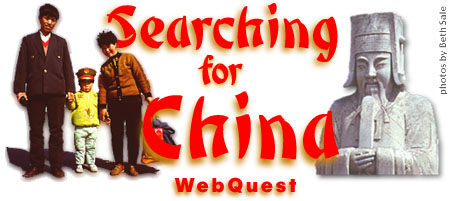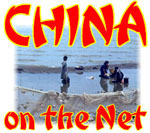

Visit our series of five other China-related educational Websites.
![]()
Introduction | Quest(ion) | Background | Individual Roles | Group Process | Feedback | Conclusion | Dictionary
![]()
China is a majestic* country (note: links followed by * go to a dictionary definition) with a long and interesting history. If, like most people in the Occidental* world, you've never been to this fascinating land, you might want to take a brief tour. Go ahead and walk a few kilometers of The Great Wall or step foot into The Forbidden City or voyage to the Yellow Mountains.
But beyond these tourist stops lives another, more complex, China. Currently, the people of China are experiencing great economic and social upheavals*. Such things as the situation in Tibet, Tiananmen Square massacre, and a scandal about treatment of orphans have brought some people to call for boycotts against China.
Being faced with the task of understanding something as complex as a nation, you might want to give up. Sometimes in life you have that choice. But to give up trying to understand the China would mean giving up chances to benefit financially, to help people, to save some of the world's natural and artistic treasures, to protect the safety and security of millions of people, or to enlighten people's lives with greater religious insight. You see, you can't give up. So, if you're ready to begin, you might want to read a Travel Advisory before embarking* on our journey.
Introduction | Quest(ion) | Background | Individual Roles | Group Process | Feedback | Conclusion | Dictionary
![]()
The United States government feels very strongly about the need to understand China. To do this effectively, a special fact-finding team is being assembled that will travel to China to investigate the country, the people, and the culture. Instead of sending only diplomats or politicians, the team will comprise* people from very different backgrounds so that the facts they find present as much truth about China as possible. It's hoped that instead of bringing back stereotypes and postcards, the team members will come away with an accurate and informed perspective*.
| Specifically, your Quest(ion) is: What actions should the U.S. take in its policy towards China? Your team will develop a Group Report that contains a Three Point Action Plan taking into account the following perspectives: Business, Cultural, Religious, Human Rights, Environmental, and Political. |
By completing this WebQuest you should achieve the following goals:
- develop an interest in the study of China.
- use the power of the Internet for advanced exploration of China.
- learn information about six key aspects of Chinese culture.
- realize that complex topics can be looked at from various perspectives.
- formulate and support an argument from one of the six perspectives.
- work with your teammates to problem-solve a combined action plan.
- question the nature of international relations in our more interdependent world.
You should be able to achieve these goals by completing a process where you join a team and take on one of the roles listed in the Quest(ion). After each becoming experts on one of the different roles and generating a Full Report, you and your teammates will work together to create a Group Report for the American people (also known as your classmates and the World Wide Web community). This report presents your team's combined answer to the Quest(ion). You can use a Rubric to see how your work might be evaluated.
Introduction | Quest(ion) | Background | Individual Roles | Group Process | Feedback | Conclusion | Dictionary
![]()
The Journey of a Thousand Miles...Who are the Chinese people? What makes them tick? Is this as easy a question as it sounds? Think about how difficult it would be for someone to describe you. Are you a person who always acts the same way? Aren't you sometimes happy, sometimes sad? Sometimes friendly, sometimes angry? Sometimes giving, sometimes selfish? Think about groups of people. Wouldn't you expect them to be complex and changing, too? Now think about China with over 1 billion people (more than 4 times the population of the United States!). Is it any wonder that to individuals in the western hemisphere, the Chinese are stereotypically seen as inscrutable* ? But we won't fall into stereotypes, because the gig idea behind this WebQuest is that nothing is inscrutable if you look long and hard enough. So where do we begin our Search for China...?
... begins with just one step. And we will begin here. Our minds work better when they are ready to take in new information: no matter how many maps you have, if you haven't turned on the light, you'll still be in the dark. Your mind is that light. So the first activity is a short one to help you and your teammates get a better understanding of the key issues involving China (and to know your teammates better). Click on the link below to go to the activity.
Exploring Chinese Issues
Introduction | Quest(ion) | Background | Individual Roles | Group Process | Feedback | Conclusion | Dictionary
![]()
Looking at Issues from Different PerspectivesBecause China is a complex country, it would be silly to look at it from only one perspective. If you only looked at its art, you might miss its changing politics. If you only looked at its government, you might miss important aspects of the people themselves. So the plan here is to divide expertise and look from as many perspectives as you have teammates. This is where you really begin Searching for China. Read the following instructions to get underway.
Based upon the eight main issues your team clustered, now choose which roles you will each take. Use the goal statements below to help you decide.
Note: If you have six people on your team, you can each take one role (or if you work in pairs, up to 12 people can be on one team). If you have less than six people on your team, you will have to choose the roles that you think would give you the best understanding. Will you choose similar roles or very different ones? You decide.
Role Goal Business Investor to promote economic growth Museum Curator to preserve the world's cultural treasures Religious Leader to encourage spiritual understanding Human Rights Activist to ensure that people are treated with fairness Environmental Activist to protect the earth's natural resources United States Senator to balance all the goals and keep world peace Now that you have chosen which roles you and your teammates will take, you're ready to become an expert. Dossiers* have been prepared for each role. These contain guided instructions that should help you gain a clear understanding of the issues involved in your role. Finally each dossier helps you discover some "truths" and to create an Action Plan that will be automatically formatted into your own customized report (note: To have the report automatically generated your browser must be able to use Javascript).
If you are ready, click on the manilla envelope or role below, then complete the activities in your dossier.
Business Investor Human Rights Activist Museum Curator Environmental Activist Religious Leader United States Senator
Introduction | Quest(ion) | Background | Individual Roles | Group Process | Feedback | Conclusion | Dictionary
![]()
Now that each member of your team has become an expert from one perspective, we're ready to combine what each of you has learned into your Group Report. This is not easy because you and your teammates each feel you've found the best solution based upon what you feel is most important. But problems come up: what's good for business may not be good for human rights or the environment. What is good for museums is not always good for religious temples. What's good for peace and stability may not be good for business or freedom of speech. Ah-oh! What will you do?It looks like your team is going to have to dig deeper to come up with a compromise plan that will combine what you all think is important. We know the answer is not easy. That's because the questions are real! In the following group activity, you and your teammates will work through a process to help you find a common Group Report. Click on the link below to go to the activity.
Creating a Group Report
Introduction | Quest(ion) | Background | Individual Roles | Group Process | Feedback | Conclusion | Dictionary
![]()
And you thought you were finished! Suggesting the best actions for the U.S. to take in its policy with China took a lot of work. But unless you test your ideas with real people, all you've done is to role-play. You can look for contacts in your school or local community or use the Internet to make a connection. If you decide to find a real world contact from the Internet, you can find all the links used in Searching for China (and more!) in the Website below. Use the instructions below to finish the project.

- Surf through the links most closely related to the proposals in your Special Report and see if there is a chat, bulletin board, discussion group or e-mail link posted on the Website. (Note: you can also contact your own U.S. senator with ZIP to It).
- Look for three different places to send your Group Report with its Three Point Action Plan.
- Double check to make sure your whole group has proofread your Special Report.
- Write an introduction to your e-mail message that gives background on why you are writing to this particular person and that you'd like to get feedback on your ideas for working constructively with China.
- Send the report to the three locations. If you are doing this WebQuest in a school setting, use your school's policy for e-mailing, cc'ing teachers, etc.
Introduction | Quest(ion) | Background | Individual Roles | Group Process | Feedback | Conclusion | Dictionary
![]()
We hope that by Searching for China you now appreciate the complexity of international relations, the need to look at challenging questions from different perspectives, and the power of the Internet for making contact with real people. Just to give you something more to think about, some people might suggest another Quest(ion) related to the U.S. and China: what gives us the right to tell a world power with four times our population what to do? Maybe, because our nation is only 200 years old, we should respect countries that have been around over 20 times longer than we? Maybe, because ours is a democratic system of checks and balances that values individual rights, we have something the world needs to hear? Sounds like this could start another WebQuest, huh?
It's clear, the world is full of complex topics that need sharp-thinking people to understand them and make decisions. There is a saying, "Knowledge is Power." Through your team's activities, you've learned strategies for analyzing complex topics, formulating action plans, and working together toward effective compromise solutions. We hope you feel this new power that you've gained. What will you do with it?
Introduction | Quest(ion) | Background | Process | Resources | Feedback | Conclusion | Dictionary
![]()
|
First Launched April 1995. Last updated February, 2005 Created by Tom March, Applications Design Team/Wired Learning |